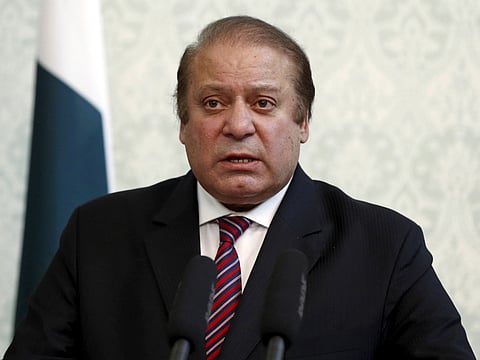Pakistan’s mounting challenges
In policy terms, the issue of moral authority is a huge prerequisite for the country to overcome its current pitfalls

Friday’s annual budget in Pakistan marked a historic event for Prime Minister Nawaz Sharif, just as he remains caught in a battle with his political foes over recent revelations surrounding massive overseas wealth belonging to his three children.
As Sharif recovers from a major heart surgery in the United Kingdom, which was undertaken just days before the budget was announced, his future remains shrouded in uncertainty. Now in his third five-year tenure as Pakistan’s Prime Minister, the budget was the first announced by a Sharif-led government after entering its fourth year in office. Sharif’s previous two stints, each of five years, were both interrupted before the halfway mark.
But rather than consolidate his position, Sharif remains on a visibly slippery slope. The crash in Pakistan’s agriculture, which shrunk in real terms in the past year, is bound to throw up deep-rooted political challenges. More than half of Pakistan’s population relies on farm incomes as their main source of earning.
Sharif’s other main challenge remains his government’s success or failure in improving one of the world’s worst-performing systems of tax collection. More than 99 per cent of Pakistan’s population does not pay income tax.
Under Sharif’s watch, initiatives to sign up more Pakistanis to become tax payers have generally failed. In one widely cited case, Sharif’s government set about this year to attract up to one million new tax payers. With the financial year (July-June) near its end, just around 9,000 new tax payers have signed up under that plan.
It is clear that Sharif and his government simply do not have what it takes to inspire popular compliance with Pakistan’s tax laws. Meanwhile, the budget came with few robust commitments to turn around the fate of Pakistan’s agriculture. Though some measures in this area were indeed announced, such as lower prices of chemical fertilisers and lower electricity tariff for water pumps on farms, it was clear that there remains a much larger gap in need of being addressed.
The challenges surrounding Sharif’s government have raised at least two compelling questions over the fate of Pakistan’s democracy. On the one hand, it has become increasingly clear that Sharif remains an inactive player by way of leading the way to a more functionally active parliamentary democracy. Sometimes, for weeks at a time, he does not appear on the floor of the parliament. This attitude is indicative of a leader who appears to have little interest in breaking new ground to establish fresh parliamentary traditions that in time will also lift the quality of Pakistan’s democracy.
On the other hand, Sharif’s own attitude and that of his colleagues from the ruling Pakistan Muslim league — Nawaz (PML-N) by way of respecting well-recognised democratic norms, leaves much to be desired. Since the revelations surrounding the offshore wealth of his children first surfaced, Sharif’s reaction all along has been to simply put up a firm defence without conceding in the least bit that an impropriety had occurred. And more recently, other PML-N leaders have defended the prime minister too by resorting to the plea that the wealth of his children should in no way raise questions about the prime minister’s integrity.
Clearly, these are highly untenable positions. For any democratic framework to progress and consolidate, due attention must be paid to propriety or the lack of it surrounding key leaders. Moreover, Pakistan’s mounting challenges in areas like reforming the tax collection system require first and foremost that the country’s political leaders must be armed with their own moral authority. Once that moral authority is surrounded by uncomfortable questions, it leads to erosion of credibility and there is no way that Pakistanis from the grass roots will agree to accepting any painful change.
In policy terms, the matter of moral authority is a huge prerequisite for Pakistan to overcome its challenges. Though otherwise known as the Islamic world’s only country armed with nuclear weapons, Pakistan’s prospects have suffered badly owing to a crisis surrounding its institutions and system of governance.
The challenge thrown up by Pakistan’s stricken agricultural sector will require not just additional financial resources, but also a major push to reform key institutions. A combination of years of neglect and growing challenges such as corruption have together hampered the performances of government-run networks, such as agricultural research outfits and service delivery networks.
A failure to tackle challenges related to either agriculture or an increasingly defunct educational system will only widen an already explosive situation. Pakistan also faces a major population surge, beyond being home to approximately 200 million people. Additionally, there is a pressing need to revamp the economy in order to work actively towards providing sources of employment to a large chunk of the population that is young. At the same time, Pakistan also faces the need to undergo rapid modernisation in various spheres of public life.
Even if Sharif survives the questions related to his children’s offshore wealth, the relief to the prime minister will likely be only temporary. Going forward, Pakistan’s mounting challenges will keep on throwing up the need for aggressive reforms. Ironically, reforming the country in a meaningful and sustainable way will indeed require a sea-change of the kind not seen before. The writing on the wall is already there — irrespective of whether Pakistan’s ruling elite cares to read it or not.
Farhan Bokhari is a Pakistan-based commentator who writes on political, security and economic affairs.


